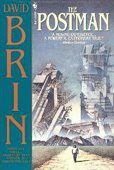
 Anyone who has read this blog knows that I am a fan of apocalyptic fiction. This weekend I finished a book that I'm very surprised to not have read many years ago. David Brin's The Postman is a well known, perhaps classic, example of the post-apocalytic genre. Published in 1985, it may well have been one of the last "world ends in nuclear disaster" novels written.
Anyone who has read this blog knows that I am a fan of apocalyptic fiction. This weekend I finished a book that I'm very surprised to not have read many years ago. David Brin's The Postman is a well known, perhaps classic, example of the post-apocalytic genre. Published in 1985, it may well have been one of the last "world ends in nuclear disaster" novels written.Dies the Fire is the first book in a series written by S.M. Stirling with more or less the same premise. However since Stirling is writing in the 2000's, he needs a different catastrophe to wipe out most of humanity, and settles for a mysterious "event" that somehow makes combustion and electricity no longer work. An interesting premise for a post-apocalyptic world.... and Stirling does a marvelous job in describing the consequences and ramifications of a world without power...
But anyway, as I was reading Brin's book I was struck by the similarities:
- Brin centered his world on western Oregon, specifically the Willamette Valley. Stirling centered his world on western Oregon, again, specifically the Willamette Valley.
- Brin's bad guys are leftover military survivalists who are attacking the peace-loving folk who are just trying to get back on their feet. Stirling's bad guys (in the first trilogy anyway... there is a second trilogy being written in the same world) are led by a history professor who sets himself up as a medieval warlord, partnered with some gang lords who manage to escape the big cities, and... guess what, are attacking the peace-loving farmers who are just trying to get back on their feet. It takes Stirling three books for the good guys to defeat the bad guys and his second series has new bad guys... ultra-religious ones this time with a great acronym of a name, CUT, which stand for Church Universal and Triumphant.
- One of Brin's heroes, George Powhaten, is an aging Buddhist. One of Stirling's heroes is a Wiccan named Juniper MacKenzie.
I really like Stirling's books, his characters, and his political/religious takes. But WOW, after reading The Postman, I found his settings and characterizations eerily reminiscent of Brin's world. Do I think this is a bad thing? Not at all. Authors don't come up with ideas in a vacuum after all, and most authors are avid readers. It's possible that Stirling read Brin's book, really liked the setting (although Brin's rainy and cold northwest coast is not that appealing), mixed it with some of his own ideas and experiences, and produced a similar yet strikingly different work of fiction. You have to wonder, though, is it something about Oregon State University, or the city of Corvallis...
I think I'll put Corvallis on my "to visit" list of cities.
1 comment:
This is what I think: The postman
Post a Comment